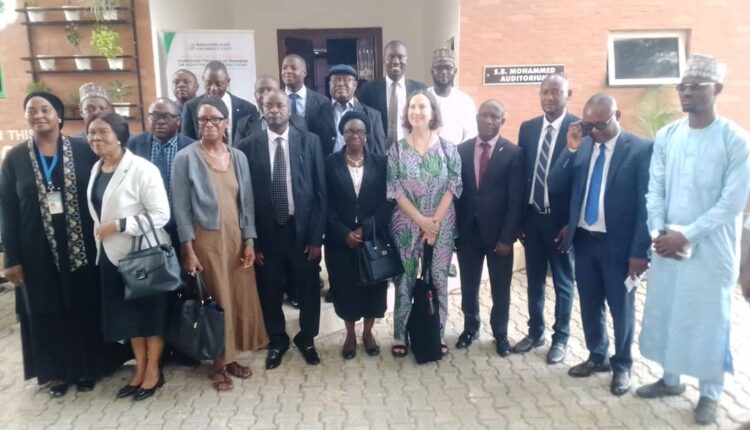
By Olu Benjamin
Some Legal experts have applauded Nasarawa State University Keffi (NSUK) for organizing a workshop on plea bargaining to expose students and other participants on the concept in Nigeria’s legal system.

The legal experts applauded the University’s Faculty of Law for the initiative in separate remarks at the workshop held at the university in Keffi local government area of Nasarawa state on Wednesday.
Our reporter reports that the workshop organized in collaboration with the United States Embassy and College of Law, University of California, San Francisco had in attendance Mrs Demarris Evans as guest speaker and several legal experts and students.
The topic of the public lecture is “Plea Bargaining and Sentencing Guidelines in the Context of Restorative Justice: The US Experience” delivered by Evans, a Deputy District Attorney, Alameda County, California, United States of America (USA).
Barr. Labaran Magaji, Nasarawa state Commissioner for Justice and Attorney General said the workshop on the concept of plea bargaining is a very important one as it exposes how plea bargaining can help to reduce length of trials in courts.
“This is a very important workshop and I must commend the dean, faculty of law and management of Nasarawa State University Keffi for organizing it to impact this knowledge on participants especially the law students.
“They now know how important the concept of plea bargaining is in the legal system. If you observe on the average a full trial takes about two to three years but once there is plea bargain it shortens the length of period the trial will hold.
“Secondly it reduces the burden and pressure on the courts. Also it gives the defendant the opportunity to enjoy a mitigated sentence.
“There are wide range of issues contained in plea bargaining. That is why i commend the university management for this training because non lawyers too can benefit from it,” he said.
He then revealed that the Nasarawa state government has already began to implement the plea bargaining concept with some accused persons giving the option instead of facing a lengthy trial.
“We have a form. We have a template guided by our Criminal Justice Administration Law which is pulled from Section 170 of the Administration of Criminal Justice Act and we have incorporated it into our own regulations and template through which all defendants have to sign.
“The victims will sign. Then the Attorney General will also sign and the court will now adopt it as the consent judgement and implement what it contains,” he said.
In his own remarks, Hon. Justice Biobele Georgewill, Presiding Justice of the Court of Appeal, Makurdi Division describe the public lecture as the type Nigerian universities need to organize regularly to educate, inform and enlighten the public on important issues.
Georgewill who also praised the university for the workshop said the concept of plea bargaining was also important for judges to understand, appreciate it and put it to use appropriately.
“Plea Bargaining is very important that we understand the principles and application of the concept. It is not the system to give an accused person a handshake on the wrist and let him go. It’s much more than that,” he said.
Prof. Maxwell Gidado, Former Dean, Faculty of Law, NSUK also described the plea bargaining workshop as an eye opener especially for law students who are aspiring to go into practice and take on criminal cases.
Gidado who commended the management of the university for the support in making the workshop possible told participants to pay keen attention to the lecture on how to apply it in the Nigerian context for clients who chose to opt for plea bargaining instead of a lengthy trial.
In her remarks, Prof Sa’adatu Liman, Vice Chancellor, NSUK said it was a delight to have the public lecture due to the impact it would have on participants especially students on the concept of plea bargaining while handling a case.
In his opening remarks, Prof Elijah Okebukola, Dean, Faculty of Law, NSUK said though the public lecture was the first of it’s kind from the faculty, more should be expected to broaden the intellect of students on topical issues in the legal profession that may not be necessarily gotten in the classroom.
He described Plea bargain as the process in criminal proceedings whereby the defendant and the prosecution work out a mutually acceptable disposition of the case.
He said this includes the plea of the defendant to a lesser offence than that charged in the complaint or information and in conformity with other conditions imposed by the prosecution in return for a lighter sentence than that for the higher charge subject to the Court’s approval.
In her paper presentation, Evans said in the US context there are different types of Plea deals that can be reached between the prosecutor and the accused such as the prosecutor dropping one or more charges to secure a lighter conviction.
“Another one is the sentence is more lenient so the amount of time been spent in custody is now less or it can be an agreement that stipulates to a version of facts that takes out certain version of facts which is known as fact bargaining.
“Those are the different types of Plea deals. These are only available with these types of negotiating with the prosecutor in the United States,” she said. END.


